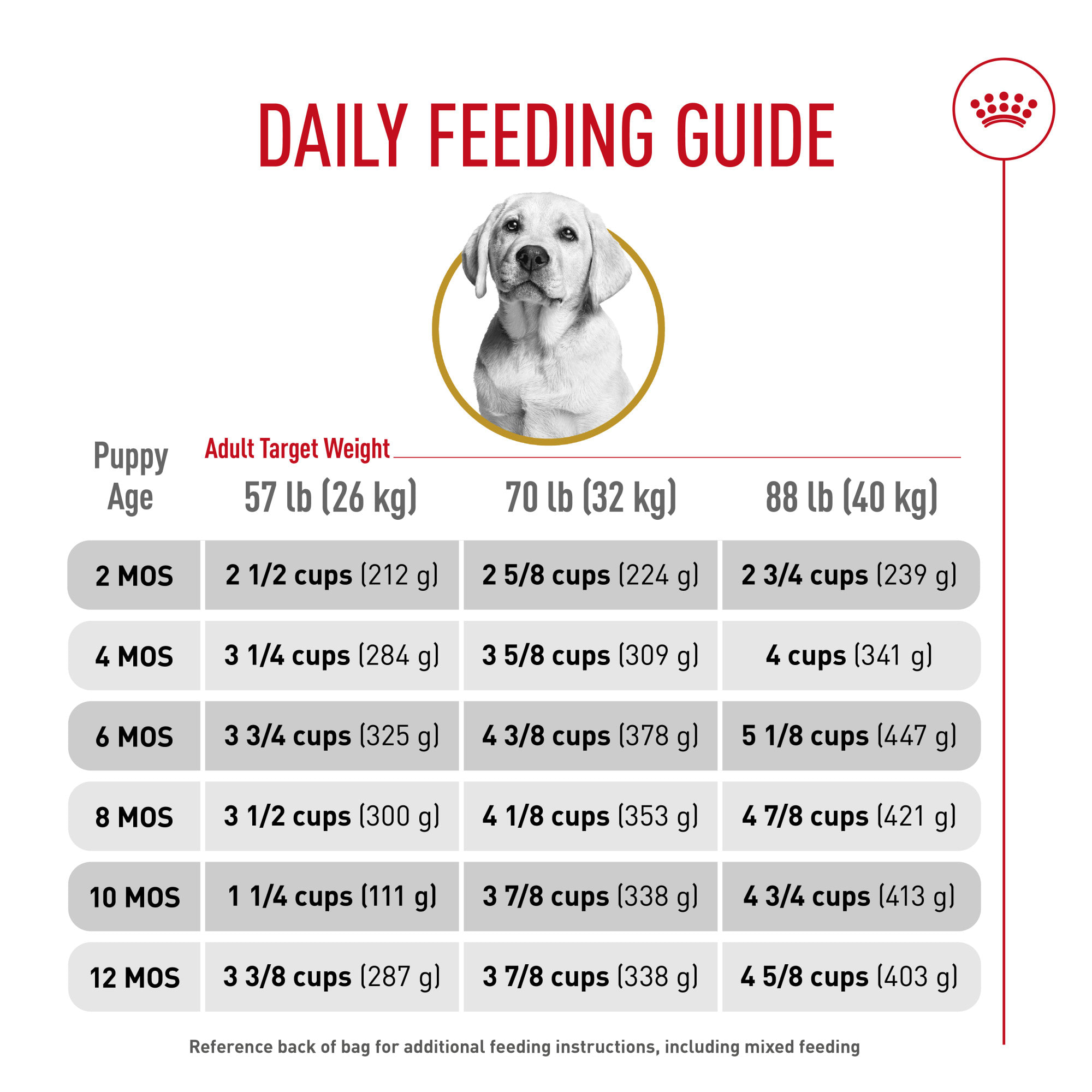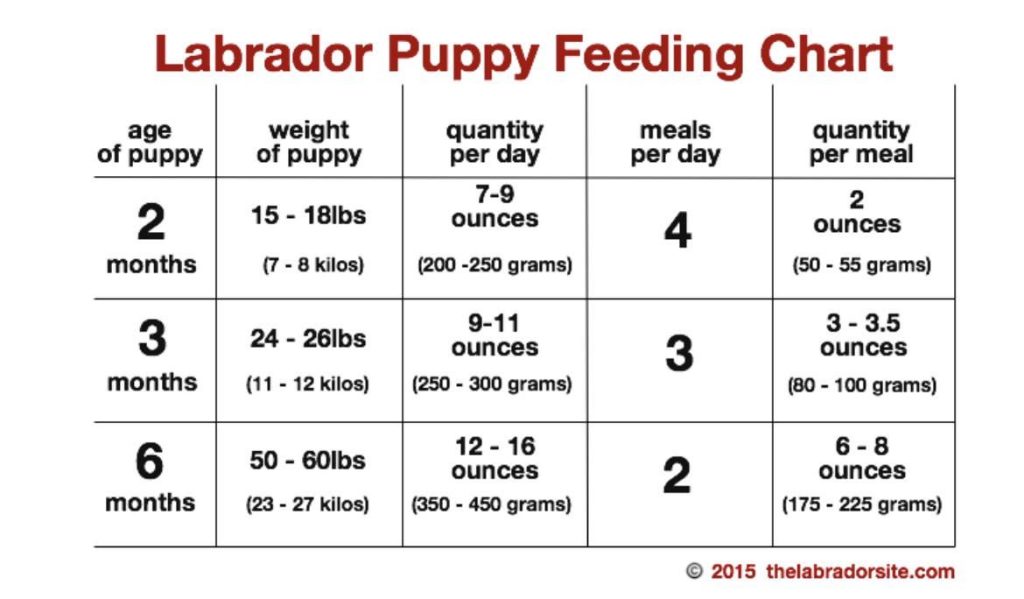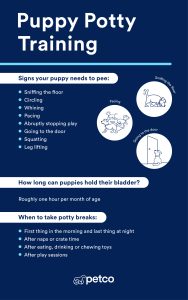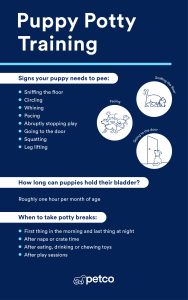Bringing a Labrador puppy into your life is exciting, but it also comes with important responsibilities—especially when it comes to feeding. You want to make sure your puppy grows up healthy, strong, and full of energy.
The food you give and how you feed can make all the difference. If you’re unsure about what, when, and how much to feed your furry friend, this guide is made just for you. Keep reading to discover simple, practical tips that will help you give your Labrador puppy the best start in life.
Your puppy’s health and happiness depend on it!
Choosing The Right Food
Feeding your Labrador puppy the right food helps them grow strong and healthy. Puppies need special nutrients to support their fast growth.
Choosing food made for puppies ensures they get the right balance of vitamins and minerals. It also helps avoid health problems later.
Puppy-specific Formulas
Puppy-specific formulas contain nutrients that adult dog food does not have. These foods support healthy bones, muscles, and brain development.
Look for foods labeled for large breed puppies like Labradors. They have the right calcium and phosphorus levels to protect growing joints.
Dry Vs. Wet Food
Dry food is crunchy and helps keep your puppy’s teeth clean. It also lasts longer once opened and is easy to store.
Wet food has more moisture, which can help puppies stay hydrated. It often smells stronger and may be more appealing to picky eaters.
- Dry food is better for dental health
- Wet food is easier to chew for very young puppies
- Mixing both can give variety and balanced nutrition
Natural And Organic Options
Natural and organic dog foods use fewer artificial ingredients and preservatives. This can be gentler on a puppy’s stomach.
These foods often contain real meat, vegetables, and grains. They provide good nutrition and may reduce allergies or food sensitivities.
- Check labels for real ingredients first
- Look for certified organic seals if you want organic
- Talk to your vet before changing to natural or organic food

Credit: www.petco.com
Feeding Schedule
Feeding your Labrador puppy the right way helps them grow healthy and strong. A good schedule keeps their energy steady all day. It also helps avoid overeating and stomach issues.
Each puppy is different, so their feeding needs change as they grow. Watch their weight and behavior to adjust feeding times and amounts.
Frequency By Age
Young puppies need more frequent meals than older dogs. Feeding too little or too much can affect their health. Here is a simple guide for feeding times by age.
| Age | Number of Meals per Day |
| 6 to 12 weeks | 4 meals |
| 3 to 6 months | 3 meals |
| 6 to 12 months | 2 meals |
| 12 months and older | 2 meals |
Portion Control
Giving the right portion size is very important. Too much food can cause weight gain. Too little can slow growth. Use your puppy’s weight and age to decide portions.
- Follow feeding amounts on puppy food packages.
- Divide daily food into the number of meals.
- Watch your puppy’s body shape and weight weekly.
- Ask your vet for portion advice if unsure.
Adjusting As They Grow
As your Labrador grows, their feeding needs change. Growth slows after one year. You should reduce calories and adjust meal size. Keep checking their weight and energy level.
| Age Range | Feeding Notes |
|---|---|
| Up to 6 months | Feed growth formula with more calories. |
| 6 to 12 months | Switch gradually to adult food. |
| 1 year and older | Feed adult portions and monitor weight. |
Nutritional Needs
Labrador puppies need good nutrition for healthy growth and energy. Feeding the right food helps build strong bones and muscles.
Knowing what nutrients your puppy needs can keep them happy and active. It is important to give balanced meals daily.
Protein Requirements
Protein helps build your puppy’s muscles and tissues. Young Labradors need more protein than adult dogs. High-quality protein sources include chicken, beef, and fish.
Make sure the food contains at least 22% protein. This supports healthy growth and strong immune systems.
Essential Vitamins And Minerals
Vitamins and minerals keep your puppy’s body working well. They help with bone growth, vision, and blood health. Puppies need vitamin A, D, E, calcium, and iron.
- Vitamin A: supports eyesight and skin
- Vitamin D: helps absorb calcium for bones
- Vitamin E: protects cells from damage
- Calcium: builds strong teeth and bones
- Iron: carries oxygen in the blood
Fats And Carbohydrates
| Nutrient | Role | Sources |
|---|---|---|
| Fats | Provide energy and support brain health | Fish oil, chicken fat, flaxseed |
| Carbohydrates | Give energy and help digestion | Rice, oats, sweet potatoes |
Hydration Importance
Keeping your Labrador puppy well hydrated is key to their health. Water helps with digestion, temperature control, and joint lubrication.
Young puppies need more water per pound than adult dogs. Watch their water habits closely to keep them healthy and happy.
Water Intake Guidelines
A Labrador puppy should drink about 1 ounce of water per pound of body weight daily. This amount can increase with activity and weather.
- Offer fresh water several times a day.
- Check water bowls for cleanliness daily.
- Adjust water amounts during hot weather or after playtime.
- Provide water near their sleeping and play areas.
Signs Of Dehydration
Watch for these signs to catch dehydration early in your puppy:
- Dry nose and gums
- Sunken eyes
- Loss of skin elasticity
- Weakness or lethargy
- Dark yellow urine or reduced urination
Keeping Water Fresh
Fresh water encourages your puppy to drink more. Clean the water bowl often to avoid bacteria growth.
| Tip | Reason |
|---|---|
| Change water twice daily | Prevents bacteria and keeps water cool |
| Use stainless steel or ceramic bowls | Reduces odor and is easy to clean |
| Place bowls in shaded areas | Keeps water from heating up too fast |
| Rinse bowls with hot water weekly | Removes buildup and germs |
Avoiding Common Feeding Mistakes
Feeding your Labrador puppy the right way helps them grow strong and healthy. Many owners make simple mistakes that can affect their puppy’s health.
Understanding what to avoid during feeding can keep your puppy happy and energetic for years.
Overfeeding Risks
Giving too much food can cause your Labrador puppy to gain extra weight. Overfeeding puts stress on their bones and joints.
Obesity can lead to health problems like diabetes and heart disease. It also reduces your puppy’s energy and agility.
- Stick to the feeding amounts suggested by your vet or on the food package.
- Feed your puppy at regular times each day to avoid overeating.
- Watch your puppy’s body shape and adjust food if they look overweight.
Harmful Foods To Avoid
Some human foods can be dangerous or toxic for Labrador puppies. Avoid feeding these to keep your puppy safe.
- Chocolate – Can cause vomiting and heart problems.
- Grapes and raisins – May cause kidney failure.
- Onions and garlic – Harm red blood cells and cause anemia.
- Avocado – Contains a toxin called persin.
- Caffeine – Leads to restlessness and faster heartbeat.
If your puppy eats any of these foods, contact a vet immediately for advice.
Managing Treats And Snacks
Treats help train and reward your Labrador puppy, but too many can cause weight gain. Use treats wisely and choose healthy options.
Limit treats to less than 10% of your puppy’s daily calories to keep a balanced diet.
- Pick small, low-calorie treats made for puppies.
- Use treats only during training or special moments.
- Avoid giving table scraps or fatty snacks.
- Always provide fresh water alongside treats.

Credit: www.budgetpetproducts.com.au
Monitoring Growth And Health
Feeding a Labrador puppy well helps them grow strong and healthy. Watching their growth and health is very important. This helps you know if they get the right food and care.
Regular checks keep your puppy safe from health problems. You can spot issues early by tracking their weight and diet. Good care means a happy puppy and a happy home.
Tracking Weight Progress
Weigh your Labrador puppy weekly using a small scale. Write down the weight to see how they grow over time. Steady weight gain shows good health.
If your puppy loses weight or does not gain enough, check their feeding habits. Adjust the food portion or type if needed. Always keep fresh water available.
- Weigh your puppy at the same time each week
- Keep a chart of their weight progress
- Look for steady increases in weight
- Notice any sudden changes or drops
Recognizing Nutritional Deficiencies
Signs of poor nutrition include dull fur, tiredness, and slow growth. Your puppy may also have bad breath or loose stools. These show they may lack important nutrients.
Make sure your puppy gets a balanced diet with protein, fats, vitamins, and minerals. Use food made for puppies to meet these needs. Watch for any changes in their health or energy.
- Dull or patchy fur
- Low energy or weak muscles
- Loss of appetite
- Diarrhea or constipation
- Slow or stunted growth
When To Consult A Vet
See a vet if your puppy shows signs of illness or poor growth. Sudden weight loss or lack of appetite needs quick attention. Early care helps avoid serious problems.
Regular vet visits help keep your puppy healthy. They can give advice on feeding and spot hidden health issues. Always ask if you are unsure about your puppy’s health.
- Persistent vomiting or diarrhea
- Not gaining weight after several weeks
- Swelling or pain in the body
- Behavior changes like hiding or aggression
- Difficulty breathing or coughing
Supplement Options
Feeding your Labrador puppy the right food is very important. Sometimes, adding supplements can help support their growth and health.
Not all puppies need supplements. Choosing the right types and amounts keeps your puppy safe and healthy.
When Supplements Help
Supplements can help if your puppy has special needs. For example, puppies with weak bones or skin problems might benefit from certain vitamins.
- During growth spurts to support bone development
- If your vet finds a nutrient deficiency
- When your puppy has a poor appetite
- To improve coat and skin health
Safe Supplement Choices
Pick supplements that are made for puppies. Always check the label and give the right dose to avoid problems.
| Supplement | Benefit | Safe Dosage |
| Omega-3 Fatty Acids | Supports brain and skin health | As directed by vet |
| Calcium | Helps strong bones and teeth | Only if vet advises |
| Probiotics | Improves digestion | Follow package instructions |
Avoiding Over-supplementation
Too many supplements can harm your puppy. Overdose may cause stomach upset or other health issues.
- Never give more than the recommended dose
- Do not combine multiple supplements without vet advice
- Watch for signs like vomiting or diarrhea
- Stop supplements if your puppy shows any side effects

Credit: pet-supermarket.co.uk
Frequently Asked Questions
How Often Should I Feed My Labrador Puppy Daily?
Labrador puppies need feeding 3 to 4 times a day. This schedule supports their growth and energy needs. As they grow, reduce feedings to twice daily after six months.
What Is The Best Food For Labrador Puppies?
Choose high-quality puppy food rich in protein and essential nutrients. Look for brands with real meat and balanced vitamins. Avoid fillers and artificial additives to ensure healthy development.
How Much Food Does A Labrador Puppy Need?
Feed according to your puppy’s weight and age. Typically, 1 to 2 cups per meal works for most puppies. Always check your vet’s advice to avoid overfeeding or underfeeding.
Can I Give Treats To My Labrador Puppy?
Yes, treats are okay but limit them to 10% of daily intake. Use healthy treats like small pieces of fruits or specially made puppy treats. Treats help in training and bonding.
Conclusion
Feeding your Labrador puppy correctly ensures they grow healthy and strong. Balance their diet with quality food and regular mealtimes. Remember to adjust portions as they grow. Avoid overfeeding to prevent weight issues. Fresh water is essential for hydration. Monitor their eating habits for any changes.
Always consult a vet for specific dietary advice. A well-fed puppy is a happy puppy. Patience and consistency in feeding routines make a difference. Enjoy nurturing your furry friend with love and care. A healthy diet sets the stage for a joyful life together.

Emily Barker is the founder of ChillDogLife.com, a space dedicated to helping pup parents discover the best dog products, lifestyle tips, and cozy ideas for happier homes.
A lifelong dog lover, Emily combines her passion for pets with a knack for research to share trusted recommendations on everything from toys and furniture to health and everyday care.
Her goal is simple: to make life easier, stylish, and more joyful for dogs and the people who love them.







